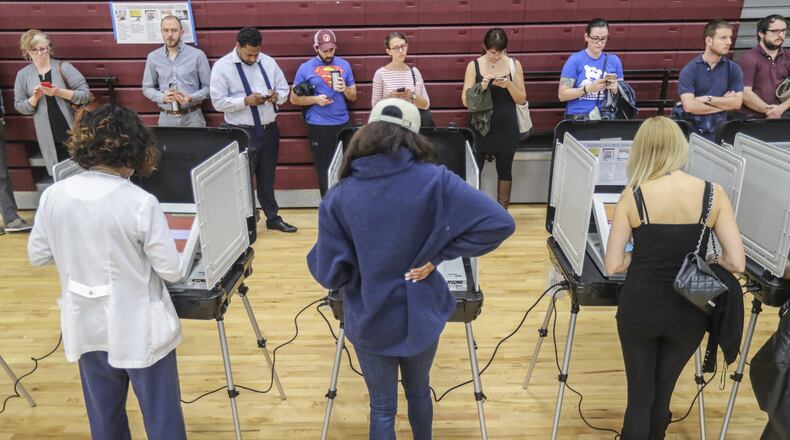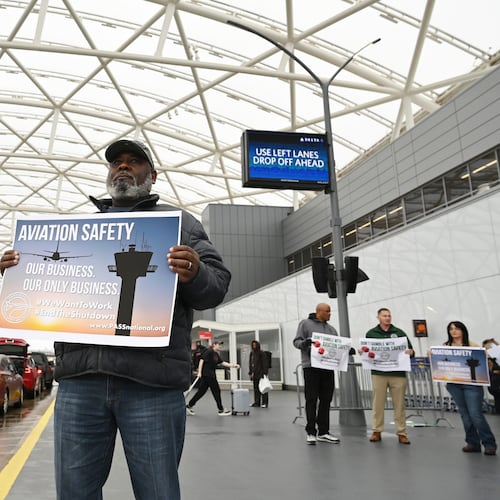Georgia voters dealt with long lines, malfunctioning election equipment and registration discrepancies as they swamped precincts Tuesday with an unprecedented turnout for a midterm election.
Wait times of more than an hour were the most common hurdle facing voters across the state.
But technical problems — like failing to plug in voting machines — worsened matters for some voters trying to get their ballots in.
Three precincts in Gwinnett County had some of the most severe difficulties, causing them to stay open past the normal 7 p.m. closing time.
The Annistown Elementary precinct remained open until 9:25 p.m. because of extensive issues with the electronic ExpressPoll system, which is used to check in voters before they’re issued voting access cards. Anderson-Livsey Elementary and Harbins Elementary precincts also stayed open late.
Three more precincts in Fulton County also stayed open as late as 10 p.m. because of extreme lines, missing registration information and a shortage of provisional ballots. Those precincts were located at Pittman Park Recreation Center, Booker T. Washington High and the Archer Auditorium at Morehouse College.
Most voters said they weren’t deterred from deciding between Democrat Stacey Abrams and Republican Brian Kemp in the race for governor.
“If I have to wait here until 8 o’clock at night, I will,” said Cheryl Strickland, who arrived at Annistown Elementary at 6:15 a.m. and was still waiting more than four hours later.
Voters were offered provisional ballots, but she and other voters were skeptical of using paper.
Tori Frazier, 29, waited at least an hour to cast her ballot at Anderson-Livsey Elementary, where voting machines were running without power cords and died after 45 minutes of power use.
“You don’t get to have an opinion if you don’t wait in line to vote,” Frazier said.
Elsewhere, voters complained that their precincts had fewer electronic voting machines available than in previous elections, causing lines of voters to stretch around churches, schools and other precincts.
The Rev. Jesse Jackson got involved at the Pittman Park Recreation Center precinct in Fulton County, encouraging voters to remain in line after they had waited for hours. Only three voting machines were initially available before five more were sent out later.
“It’s a classic example of voter suppression, denying people easy access to exercise their right to vote,” Jackson said.
Some voters made the most of the delay. Several women grilled free burgers for voters, and a group called Pizza to the Polls delivered pizza to those waiting in line.
Many people said they’d never seen turnout like this in a midterm election.
“We didn’t have this many for the presidential,” said Mo Steiner, a poll manager at Johnson Ferry Baptist Church in east Cobb, where long lines snaked through the church.
Voters reported problems to both The Atlanta Journal-Constitution and ProPublica’s Electionland project, which monitors voting problems around the country.
Some Georgia voters said they had troubles voting because their home addresses didn’t match their precincts. Those voters had to use provisional ballots, which will be counted if voters verify their information with their county election office within three days.
In some cases, voters said they re-registered with a new address, but they still encountered problems at the polls. Another voter said he had always voted in the same precinct but was told this year that the address had changed. They were told to cast provisional ballots.
The incidents might have been caused in part by poll workers looking up voter information incorrectly, said Candice Broce, a spokeswoman for the Georgia Secretary of State’s Office.
Several people who had become U.S. citizens recently were challenged when trying to cast their ballots because voter registration records hadn’t been updated with their citizenship status.
A federal judge recently ordered that voters should be able to cast regular ballots as long as they produce proof of citizenship to poll managers.
Additional issues included voters who were incorrectly told they couldn’t use state-issued student ID cards to meet the state requirement for photo ID.
Some voters reported that they had been told they already voted on absentee ballots when they hadn't, or they were delayed from voting because they had requested absentee ballots but later decided to vote in person.
Peachtree Corners City Councilwoman Jeanne Aulbach said she felt obligated to go to the polls.
“To me, voting is a right, a responsibility and a privilege,” Aulbach said. “It’s one of the most important things we can do for our country, our city and our state.”
Staff writers Ben Brasch, Amanda C. Coyne, Becca J. G. Godwin and Raisa Habersham contributed to this article.
About the Author
Keep Reading
The Latest
Featured




